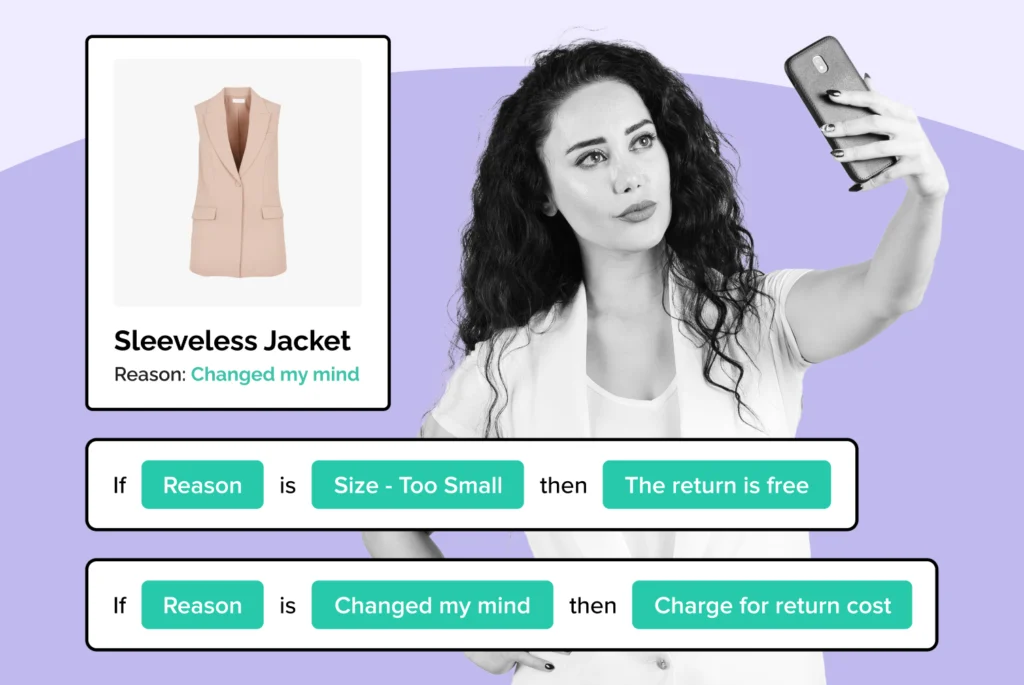
5 Effective Ways to Reduce Returns with Product Photos
Discover 5 effective strategies to enhance your product photos and minimize returns. Improve customer satisfaction and boost sales—read the article now!
Shipping, Tracking & Notifications
Boost customer experience and reduce support tickets
Realtime order and shipment tracking
Proactive order and shipping notifications
AI-Enhanced Discounted Labels
Predictive pre-purchase estimated delivery dates
Self-Serivce branded order tracking
Effortless experience delivered
Identify and Resolve Order Issues
Realtime order and shipment tracking
Make returns profitable and delight customers
Flexibility to define any return destinations & conditions
Simplify returns for your customers and team
Incentivize exchanges over returns
Returns management made easy for your team
Returns management made easy for your team
Easy claims and smart upsells
Understand why your customers are returning
In-Store & Curbside Pickup
Unify the online and the in-store experience
Hassle-free pickup experience for customers
In-Store dashboard to keep operations streamlined
In-Store and Online orders unified
Drive foot-traffic to your stores
Shipping, Tracking & Notifications
Boost customer experience and reduce support tickets
Realtime order and shipment tracking
Proactive order and shipping notifications
AI-Enhanced Discounted Labels
Predictive pre-purchase estimated delivery dates
Self-Serivce branded order tracking
Effortless experience delivered
Identify and Resolve Order Issues
Realtime order and shipment tracking
Make returns profitable and delight customers
Flexibility to define any return destinations & conditions
Simplify returns for your customers and team
Incentivize exchanges over returns
Returns management made easy for your team
Returns management made easy for your team
Understand why your customers are returning
In-Store & Curbside Pickup
Unify the online and the in-store experience
Hassle-free pickup experience for customers
In-Store Dashboard to keep operations streamlined
In-Store and Online orders unified
Drive foot-traffic to your stores
Boost customer experience and reduce support tickets
Realtime order and shipment tracking
Proactive order and shipping notifications
AI-Enhanced Discounted Labels
Predictive pre-purchase estimated delivery dates
Self-Serivce branded order tracking
Effortless experience delivered
Make returns profitable and delight customers
Flexibility to define any return destinations & conditions
Simplify returns for your customers and team
Incentivize exchanges over returns
Returns management made easy for your team
Equip your team for precise return checks.
Easy claims and smart upsells
Understand why your customers are returning
Unify the online and the in-store experience
Hassle-free pickup experience for customers
In-Store Dashboard to keep operations streamlined
In-Store and Online orders unified
Drive foot-traffic to your stores
Find the answer to all your questions
Take a step by step trip through our functionality to see how we can improve your ecommerce processes.
Explore the most comon questions about WeSupply
Calculate the ROI that WeSupply can bring you
Read actionable articles on how to optimize your post-purchase experience and decrease support tickets
Get inspired by stories of how our customers implemented an effortless post-purchase experience
Wondering if WeSupply is a good fit for you? Read through our use cases to see how we can help you increase conversion & improve CX!
A Deep Dive into Top Companies' Order Tracking & Returns Strategy
Find the answer to all your questions
Explore the most comon questions about WeSupply
Calculate the ROI that WeSupply can bring you
Request a no strings attached review of your current shopping experience and missed conversion opportunities
Take a step by step trip through our functionality to see how we can improve your ecommerce processes.
Read actionable articles on how to optimize your post-purchase experience and decrease support tickets
Get inspired by stories of how our customers implemented an effortless post-purchase experience
A Deep Dive into Top Companies' Order Tracking & Returns Strategy
Wondering if WeSupply is a good fit for you? Read through our use cases to see how we can help you increase conversion & improve CX!

In today’s fast-paced eCommerce and retail landscape, return and refund policies have become vital touchpoints in the customer experience. Additional services can enhance customer rights beyond standard policies, providing supplementary protections that ensure satisfaction and avoid disputes. These policies do more than provide convenience; they offer structure and predictability to what can otherwise be a frustrating part of shopping. With increasing return rates and growing consumer awareness, a business’s return policy is often viewed not just as customer service, but as a legal framework governing the post-purchase relationship. Clarity in these policies helps prevent disputes, builds trust, and safeguards the business from potential legal consequences. This article dives deep into the legal implications of return policies and explains when they are considered legally binding agreements.
A return policy outlines the conditions under which a customer can return a product and receive a refund, exchange, or store credit. It typically includes information on time limits, item condition requirements, restocking fees, and methods of reimbursement. While many view return policies as mere customer service guidelines, they often carry the weight of legal agreements, especially when included in a store’s Terms and Conditions.
When customers complete a purchase, they frequently agree to a company’s policies through mechanisms such as clickwrap (explicit agreement by clicking a box) or browsewrap (implied agreement by using the site). These methods serve as legal consent, making the return policy a contractual obligation. Once accepted, these terms become enforceable under contract law, assuming they are presented clearly and fairly.
Consumer rights are at the heart of return policy laws. In the United States, federal regulations and state laws grant consumers various protections regarding returns and refunds. One such regulation is the Federal Trade Commission’s (FTC) Cooling-Off Rule, which gives customers three days to cancel certain types of purchases, such as those made through door-to-door sales or temporary retail locations. It is crucial to notify sellers within the specified number of business days to ensure the cancellation is valid.
In addition to cancellation rights, consumers may be entitled to full or partial refunds depending on the nature of the transaction. If a product is defective, misrepresented, or fails to meet basic standards, most jurisdictions mandate that customers are entitled to a remedy, regardless of the retailer’s stated policy. The process of cancelling contracts and obtaining refunds can be facilitated by understanding the assistance available through the European Consumer Centre and other consumer rights tools. Businesses must account for these rights when drafting return policies, ensuring their terms align with consumer protection statutes.
The cooling-off period allows customers to cancel a purchase within a specific time frame, often ranging from 3 to 30 days. This right is especially important for high-pressure sales environments or impulse purchases. While federal law sets a general standard, the actual duration and application of cooling-off periods can vary significantly by state.
For example, in Massachusetts, consumers have until the third business day to cancel certain contracts, such as door-to-door sales, credit repair services, health club memberships, and time shares.
Retailers engaged in door-to-door sales, mobile retail units, or temporary marketplaces must pay particular attention to these laws. Non-compliance can result in fines, lawsuits, and damage to brand reputation. By incorporating the relevant cooling-off provisions into return policies, businesses demonstrate legal compliance and enhance customer satisfaction.
A vague or poorly written return policy opens the door to customer dissatisfaction and legal liability. Clear language is crucial in communicating the terms of return eligibility, shipping costs, refund timelines, and how defective items are handled. For example, stating whether customers are responsible for return shipping or if restocking fees apply can prevent disputes. Additionally, understanding the concept of implied warranty is important, as it ensures that products meet certain quality and performance standards expected by consumers.
Beyond legal compliance, a transparent return policy fosters consumer trust and loyalty. In eCommerce, where shoppers cannot physically inspect products before purchase, a fair return policy can significantly influence buying decisions. Businesses that make their return policies easy to find and understand often enjoy higher customer retention and fewer chargebacks. Emphasizing that items must be in their original packaging for return eligibility helps manage customer expectations and protects the business’s ability to resell items.
Return policy laws are not universal. In the U.S., federal rules coexist with a patchwork of state-specific regulations. For example, California requires retailers who do not offer refunds to post a conspicuous “No Refund” policy. If they fail to do so, customers may be entitled to a refund regardless of the store’s stated policy.
In the United Kingdom, the Consumer Rights Act provides robust protections. For distance sales, such as online or mail-order purchases, customers have 14 days to cancel an order and another 14 days to return it. Businesses must issue refunds within 14 days of receiving the returned item. Similarly, the European Union and other countries like Canada and Australia enforce their own laws that businesses must follow. Understanding these jurisdictional differences is crucial for global retailers who must adapt their return policies accordingly. It is also important to check the specific rules relative to the consumer’s country of purchase to understand legal guarantees and commercial warranties better.
In the realm of ecommerce, return and refund policies are not just a courtesy—they are a cornerstone of customer trust and legal compliance. A well-crafted return and refund policy should clearly outline the return process, including any associated costs such as return shipping costs. This transparency helps prevent misunderstandings and fosters customer loyalty.
Federal law mandates certain consumer protections, but state laws can vary, making it crucial for businesses to seek legal advice when drafting their policies. A clear and concise return and refund policy should be prominently displayed, such as in the website footer, to ensure customers are fully aware of the terms and conditions before making a purchase.
Many stores offer free returns to enhance the customer experience, while others may charge a fee for return shipping. Regardless of the approach, the key is to communicate these details upfront. By doing so, businesses can build trust, reduce the likelihood of disputes, and ultimately enhance customer satisfaction.
When it comes to faulty products, consumers have robust rights that retailers must respect. Depending on the return and refund policy, consumers may be entitled to a full refund, cash refund, or store credit. Retailers are obligated to provide a clear return process and refund policy, detailing the conditions under which refunds are granted.
Implied warranties and express warranties play a significant role in these scenarios. For instance, if a product fails to meet basic quality standards, consumers are entitled to a remedy, regardless of the retailer’s stated policy. In the case of door-to-door sales, consumers benefit from a cooling-off period of three business days to cancel the contract without penalty.
Health club memberships often come with specific cancellation rights, allowing consumers to cancel within a certain period, sometimes up to three years. Retailers must provide clear instructions on the return process, including any associated costs such as shipping costs, to prevent misunderstandings and ensure compliance with consumer protection laws.
By adhering to these obligations and clearly communicating the return process, retailers can avoid legal pitfalls and maintain positive customer relationships.
Refund policies detail the specifics of how and when a customer will receive money back for returned goods. While part of the broader return policy, refund terms deserve special attention. Businesses must clarify the type of refunds offered: full refund, partial refund, or store credit. Ambiguity around these terms can lead to misunderstandings and disputes.
For example, certain products may be eligible to be refunded depending on factors like sale price or item condition. To be legally enforceable, refund policies should include details such as the refund timeline, methods of refund (e.g., original payment method or gift card), and any conditions the returned product must meet. Businesses must also disclose whether non-refundable items exist and under what conditions exceptions are made. Clear, specific language helps the refund policy hold up in legal settings.
A return policy is only as good as its execution. The return process should be outlined step-by-step to avoid confusion. At minimum, the policy should explain how to initiate a return, where to send the product, who pays for return shipping, and what documents are required (e.g., receipts or return authorization numbers).
Having a clear outline for addressing customer dissatisfaction with their goods or services is crucial. Providing a straightforward return process not only improves the customer experience but also ensures the business adheres to its legal obligations. In many jurisdictions, failure to follow a published return process can void the policy’s enforceability, potentially exposing the business to regulatory fines or lawsuits.
Retailers who fail to honor their published return policies risk more than just customer dissatisfaction. Legal consequences can include customer-initiated lawsuits, chargebacks through payment processors, and action by regulatory agencies. For example, if a business promises a 30-day return window but refuses a valid return within that period, it could be found in breach of contract.
Reputational damage is another risk. Online reviews and social media can quickly amplify customer grievances, leading to loss of trust and sales. In some states, deceptive return practices can even qualify as consumer fraud. Thus, consistency in policy execution is essential for both legal and commercial reasons.
Given the complexity of return policy laws across different jurisdictions, businesses should seek legal counsel when drafting or updating their return policies. A qualified attorney can ensure the policy complies with applicable federal and state laws, protects the business’s interests, and aligns with industry best practices.
While many companies use online generators for return policy templates, these often lack the customization needed to meet specific legal requirements. Legal advice is especially important for businesses selling high-value goods, operating in multiple states or countries, or dealing with sensitive product categories such as electronics or apparel.
Wondering how WeSupply can help you nail return policy laws? You’re in the right place. A return policy isn’t just good customer service—it can be a legally binding agreement. That’s why it’s crucial to keep your policy clear, consistent, and compliant. Lucky for you, WeSupply has just the features you need to make this hassle-free.
Automated Return Authorization: No more manual mistakes! This feature automatically applies your return policy rules to every request, ensuring consistency and compliance with regulations like cooling-off periods or refund rights.
Order Management Integration: Seamlessly connects with your order system to verify returns against original purchases, helping prevent fraud and enforce your policy—key for legal protection and avoiding disputes.
Customizable Return Policies: Adapt your return rules to meet local legal requirements, whether it’s California’s “No Refund” policy or the UK’s 14-day cooling-off period. Customization means you’re always compliant, no matter where your customers are.
Analytics and Reporting: Get insights into return trends and spot potential legal risks. By identifying patterns like unmet consumer rights, you can adjust your policy to be both compliant and customer-friendly.
Navigating return policy laws doesn’t have to be stressful. With WeSupply, you’re covered! From creating clear, legally binding policies to keeping them compliant with regional regulations, WeSupply makes it simple. Plus, with customizable features and insightful analytics, you can build trust while protecting your business. Ready to see how WeSupply can make return policy compliance effortless? Book a demo today!
Simplify Returns for Your Customers and Support Team
Book a quick call with our experts to see how WeSupply can help you: simplify the Return experience with just a few clicks, reduce customer service calls and manual processing, notify your customer about their refund, automate returns and reduce user error.
Return policies are more than operational tools—they are legally binding agreements that can protect businesses and build brand trust. With clear language, legal compliance, and consistent execution, these policies serve as both shields against litigation and magnets for customer loyalty. A well-defined return policy can significantly impact consumer purchasing decisions, especially in online shopping where customers cannot physically inspect products before buying. As eCommerce continues to grow and consumer expectations rise, having a strong, legally sound return policy is no longer optional. It’s a competitive necessity and a legal imperative.
Combat inconvenience with proactivity & self service
Book a quick call with our experts to see how WeSupply can help you make returns easy for your customers with a beautiful, self-service solution that makes their experience easier while also providing new ways to lower costs and earn back revenue.
A return policy is more than just a customer service tool—it’s often a legally binding agreement that protects both businesses and consumers. WeSupply makes managing these policies effortless by offering features designed for compliance and clarity. With a self-service returns portal, customers can independently initiate returns while adhering to policy guidelines. Automated return authorization ensures that policy rules are applied consistently, minimizing manual errors. Seamless order management integration helps verify returns against original purchases, reducing fraud risks. Plus, customizable return policies make it easy to adapt to local legal requirements, while analytics and reporting provide insights to optimize policies and maintain compliance.
Stay compliant while building customer trust—Get started with WeSupply today!
Yes, a return policy is typically considered a legal agreement, especially when it is clearly stated and agreed to during the purchase process. If a business advertises a specific return timeframe or condition and the customer makes a purchase based on that policy, it becomes enforceable under contract and consumer protection laws. The seller is obligated to honor the return policy, providing refunds or replacements as specified, ensuring compliance with consumer rights.
Not necessarily. In the U.S., businesses are not required to accept returns for non-defective items unless mandated by their stated policy or local laws. However, they must comply with federal and state laws regarding defective products, cooling-off periods, and truthful advertising. It’s important to understand that a sales contract typically covers only the purchased item and not related services or products, which highlights the need to be aware of the scope and implications of sales contracts in online purchases.
A cooling-off period is a legally mandated timeframe—typically 3 to 30 days—during which a customer can cancel a purchase or return a product without penalty. It applies mainly to certain types of sales, such as door-to-door or online transactions, and varies based on jurisdiction.
WeSupply offers automated return authorization that applies your specific policy rules consistently, reducing human error and keeping your returns process aligned with legal requirements like cooling-off periods and refund rights. Additionally, customizable return policies let you adapt to varying state and country laws, ensuring compliance no matter where your customers are.
Yes! WeSupply’s order management integration cross-references return requests with original purchases, helping to prevent fraudulent returns. This not only supports legal protection but also ensures that your policy is enforced consistently, building customer trust and minimizing disputes.
Yes. WeSupply has an Official Shopify App. You can download it and start integrating with your Shopify Store.
Yes, WeSupply has an official extension for Magento. The WeSupply x Magento integration allows for automating order tracking experiences, reducing customer inquiries, automating shipping email and SMS notifications, and providing a fully branded order tracking experience
Yes, WeSupply has an official BigCommerce App. You can integrate WeSupply with your BigCommerce store to improve your post-purchase customer experience.
Learn How To Create Successful Post Purchase Email Campaigns
Build an effective post-purchase email flow that helps you increase customer satisfaction and drive revenue growth!

Discover 5 effective strategies to enhance your product photos and minimize returns. Improve customer satisfaction and boost sales—read the article now!

Learn how to optimize packaging for hassle-free returns and exchanges. Enhance customer satisfaction and streamline your process. Read the guide now!

Discover effective strategies to reduce shipping delays and enhance your logistics. Improve efficiency and keep your operations running smoothly. Read more!

Discover the key traits that define today’s influencers and how they shape marketing strategies. Enhance your influencer approach!

Learn effective post-purchase email strategies to enhance customer loyalty and improve retention. Engage your customers today!

Discover thoughtful gifts for every mom this Mother’s Day. From practical to sentimental, find the perfect option to show your appreciation!

Discover the pros and cons of return labels for online shopping. Make informed decisions and streamline your returns. Read more for essential insights!

Discover effective strategies to combat ecommerce returns fraud, including wardrobing and tag switching. Protect your business today!

Learn effective post-purchase email strategies to enhance customer loyalty and improve retention. Engage your customers today!